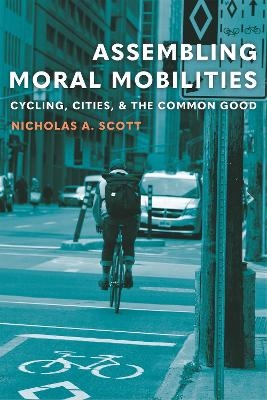
Assembling Moral Mobilities
Cycling, Cities, and the Common Good
Seiten
2020
University of Nebraska Press (Verlag)
978-1-4962-1712-7 (ISBN)
University of Nebraska Press (Verlag)
978-1-4962-1712-7 (ISBN)
Presents novel ways of understanding how cycling and driving animate urban space, place, and society and investigates how cycling can learn from the ways in which driving has become invested with moral value.
In the years since the new mobilities paradigm burst onto the social scientific scene, scholars from various disciplines have analyzed the social, cultural, and political underpinnings of transport, contesting its long-dominant understandings as defined by engineering and economics. Still, the vast majority of mobility studies, and even key works that mention the “good life” and its dependence on the car, fail to consider mobilities in connection with moral theories of the common good.
In Assembling Moral Mobilities Nicholas A. Scott presents novel ways of understanding how cycling and driving animate urban space, place, and society and investigates how cycling can learn from the ways in which driving has become invested with moral value. By jointly analyzing how driving and cycling reassembled the “good city” between 1901 and 2017, with a focus on various cities in Canada, in Detroit, and in Oulu, Finland, Scott confronts the popular notion that cycling and driving are merely antagonistic systems and challenges social-scientific research that elides morality and the common good. Instead of pitting bikes against cars, Assembling Moral Mobilities looks at five moral values based on canonical political philosophies of the common good, and argues that both cycling and driving figure into larger, more important “moral assemblages of mobility,” finally concluding that the deeper meta-lesson that proponents of cycling ought to take from driving is to focus on ecological responsibility, equality, and home at the expense of neoliberal capitalism. Scott offers a fresh perspective of mobilities and the city through a multifaceted investigation of cycling informed by historical lessons of automobility.
In the years since the new mobilities paradigm burst onto the social scientific scene, scholars from various disciplines have analyzed the social, cultural, and political underpinnings of transport, contesting its long-dominant understandings as defined by engineering and economics. Still, the vast majority of mobility studies, and even key works that mention the “good life” and its dependence on the car, fail to consider mobilities in connection with moral theories of the common good.
In Assembling Moral Mobilities Nicholas A. Scott presents novel ways of understanding how cycling and driving animate urban space, place, and society and investigates how cycling can learn from the ways in which driving has become invested with moral value. By jointly analyzing how driving and cycling reassembled the “good city” between 1901 and 2017, with a focus on various cities in Canada, in Detroit, and in Oulu, Finland, Scott confronts the popular notion that cycling and driving are merely antagonistic systems and challenges social-scientific research that elides morality and the common good. Instead of pitting bikes against cars, Assembling Moral Mobilities looks at five moral values based on canonical political philosophies of the common good, and argues that both cycling and driving figure into larger, more important “moral assemblages of mobility,” finally concluding that the deeper meta-lesson that proponents of cycling ought to take from driving is to focus on ecological responsibility, equality, and home at the expense of neoliberal capitalism. Scott offers a fresh perspective of mobilities and the city through a multifaceted investigation of cycling informed by historical lessons of automobility.
Nicholas A. Scott is an assistant professor of sociology at Simon Fraser University.
List of Illustrations
Acknowledgements
Introduction: In Search of the Good Bike Lane
1 - Domestic Mobilities: Local Tradition, Urban Place and Good Roads
2 - Industrial Mobilities: Road Engineering, Urban Planning and Infrastructuring Efficiency
3 - Civic Mobilities: Dedicated Bike Lanes, Cycling Social Movements and Cycling Justice
4 - Market Mobilities: Neoliberal Urbanism, Bike Share and the Commodification of Cycling
5 - Ecological Mobilities: Enacting Nature through Cycling
Conclusion: Good Cycling Futures
Notes
Reference List
Index
| Erscheinungsdatum | 06.03.2022 |
|---|---|
| Zusatzinfo | 38 photographs, index |
| Verlagsort | Lincoln |
| Sprache | englisch |
| Maße | 152 x 229 mm |
| Themenwelt | Naturwissenschaften ► Geowissenschaften ► Geografie / Kartografie |
| Sozialwissenschaften ► Soziologie | |
| ISBN-10 | 1-4962-1712-8 / 1496217128 |
| ISBN-13 | 978-1-4962-1712-7 / 9781496217127 |
| Zustand | Neuware |
| Haben Sie eine Frage zum Produkt? |
Mehr entdecken
aus dem Bereich
aus dem Bereich
über eine faszinierende Welt zwischen Wasser und Land und warum sie …
Buch | Hardcover (2023)
dtv (Verlag)
24,00 €
Buch | Hardcover (2024)
Schweizerbart'sche, E. (Verlag)
24,00 €
Eine Einführung in die spezielle Mineralogie, Petrologie und …
Buch | Hardcover (2022)
Springer Spektrum (Verlag)
59,99 €


